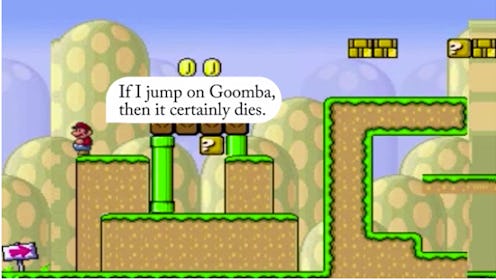News
Artificially Intelligent Mario Is A Little Creepy

Science, in all its endless glory of possibilities, is both fascinating and terrifying. While I am no opponent of human progress and exploration that doesn't harm other living beings, I do harbor a deep suspicion for artificial intelligence — something about playing God without knowing its consequences fills me with paralyzing dread, I suppose. But human curiosity always beats out the fear of AI robots strangling us all to death, it seems, because German computer researchers created a self-aware Super Mario with artificial intelligence, one that gets hungry and has an ability to knowingly murder Goombas.
As part of the Mario Lives! project, scientists at the University of Tübingen reprogrammed your favorite childhood gaming character to become a sentient entity, capable of listening, speaking, learning — even experiencing emotions. Created as a submission to the Association for the Advancement of Artificial Intelligence (AAAI) annual video competition, the researchers endowed the Italian mustachioed plumber with the ability to respond to vocal commands and questions, as well as feelings so he (it?) can learn things. For example, if Mario collects a coin, his "hunger" level decreases, thus teaching him that he has to look for coins whenever he's hungry.
Tell me that isn't at least a little bit spooky.
The video, featuring the AI Mario "interacting" with another voice, is equal parts compelling and creepy — the latter probably due to AI Mario's monotone, robotic voice that, I have to admit, really doesn't do much to up his (its??) appeal. Martin Butz, head of cognitive modeling at the University of Tübingen and one of the project's leading researchers, told Newsweek:
We took a Mario clone that has been developed by others and then we gave the agent basic knowledge of what his behavior does.
Butz also said that although the project started out as a lighthearted one, it also aimed at showing how learning principles from cognitive science and psychology can be implemented in an artificial environment:
Our motivation was to illustrate what cognitive science does research on and if these principles can be implemented and used to generate live agents that are autonomous, curious, interested about their world and then able to communicate this.
Researchers claim their project is fully functional and that they have created "an alive and somewhat intelligent artificial agent." Another one of the brains behind this AI Mario, Fabian Schrodt, told The Verge that the team is now working on a follow-up project in which both Mario and Luigi are given artificial intelligence. Not only will they be able to speak to each other, but they'll also be able to independently collect new information to share between themselves, thereby teaching one another as the game progresses. Say goodbye to your childhood — and to humanity at large.
Image: AAAI Video Competition/Youtube/Screenshot (2)